新概念英语课讲义
新概念英语第3册课程讲义Lesson2
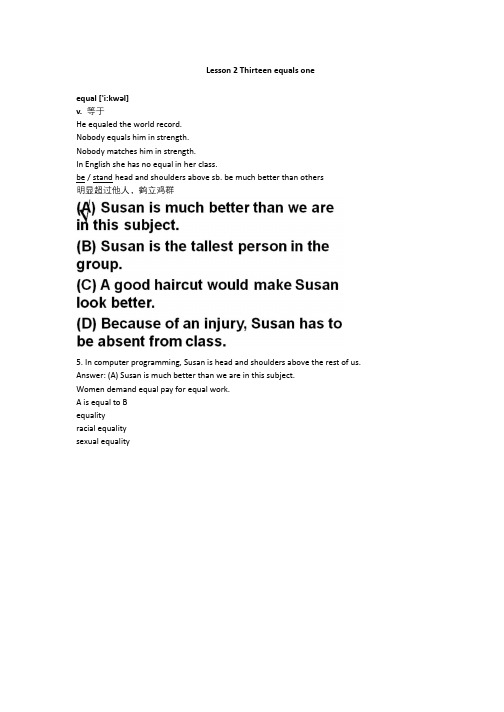
Lesson 2 Thirteen equals oneequal ['i:kwəl]v. 等于He equaled the world record.Nobody equals him in strength.Nobody matches him in strength.In English she has no equal in her class.be / stand head and shoulders above sb. be much better than others明显超过他人,鹤立鸡群5. In computer programming, Susan is head and shoulders above the rest of us. Answer: (A) Susan is much better than we are in this subject.Women demand equal pay for equal work.A is equal to Bequalityracial equalitysexual equalityWe wish to inform you that we specialize in garments for more than twenty years, and shall be pleased to establish business relations with you on the basis of equality and mutual benefits. raise [reɪz]v. 募集,筹措raiseone’s hand raise one’svoice raise one’s hatto sb. raise one’s glassto sb.raise the roofraise pigsHe has a big family to raise.We’re raising a fund for orphans.risearise arose arisenProblems arose.arousearouse one’s pity / anger …―You look happy today.―Yes. I got a raise.We pay two thousand Yuan monthly to start. It's our policy to hire on a trial basis. If you work out all right after three months you will be put on the permanent payroll and be given a raise.be always doing sth.He is always being late.People are always talking about the problems of youth.W: Mary is always complaining about her job.M: Maybe if you try typing letters every day, you'd see what it's like.Q: What does the man mean?Answer: A) The woman would understand if she did Mary's job.be forever doing sth.He is forever talking about the friendly people, the clean atmosphere, the closeness to nature and gentle pace of living.be constantly / continually doing sth.The boys are constantly / continually arguing.Your behavior reflects on me, and I can't do my job if you're constantly humiliating me. Constantly? Aside from today, give me one example.keep (on) doing sth.From the moment he arrived there, he kept on pestering his doctor to tell him when he would be able to go home.In the process, he enjoyed himself thoroughly and kept telling everybody how much he hated hospitals.do sth. all the timeW: I thought the doctor said you should stay off your foot until the swelling goes down.M: She did. It just makes me uncomfortable to ask my friends to wait on me all the time.What does the man mean?D) He doesn't like to bother people.Sam, mess up the kitchen (always)Sam is always messing up the kitchen.Bruce, leave his dirty dishes on the table (forever)Bruce is forever leaving his dirty dishes on the table.Peter, try to show me he’s smarter than me (constantly)Peter is constantly trying to show me he is smarter than me.Mary, borrow my clothes without asking me (continually)Mary is continually borrowing my clothes without asking me.Why, you, make the same mistakes (keep on doing)Why do you keep on making the same mistakes?Jane, forget to give me my phone messages (do sth. all the time)Jane forgets to give me my phone messages all the time.One would expect them to know their parts by heart and never have cause to falter.one … or anotherone cause or anotherHe is always asking me for money for one cause or another.Beginners will err at one time or another.Everyone can contribute to society in one way or another.one … after anotherone day after anotherencounter one difficulty after anotherachieve one success after anothermanage to do: 设法完成了某事As no pumas had been reported missing from any zoo in the country, this one must have been in the possession of a private collector and somehow managed to escape.fail to do: 没能完成某事When the journalist again failed to reply, the editor reluctantly published the article as it had originally been written.have sth. done 请某人做某事I'm going to have my hair cut this weekend.… people would rather pay large sums of money than have their life work destroyed by gangsters. King CharlesⅠhad his head cut off.The house had its window broken in the explosion.无灵主语/ 物称主语(inaminate subject)When reports came into London Zoo that a wild puma had been spotted forty-five miles south of London, they were not taken seriously.The sea bed was scoured with powerful nets and there was tremendous excitement on board when a chest was raised from the bottom.He lost his confidence.Confidence deserted him.I couldn't sleep that night.That night sleep eluded me.We only travelled half the distance at sunset.Sunset met us halfway.The past few years witnessed the great influx of foreigners to China, for travelling, studies or business.造句:我的小女儿总是抱怨(complain of) 各种各样的病,但她从未成功地得到允许(get permission) 呆在家里。
新概念英语第一册 Lesson2 讲义

倒背如流新概念一上Unit2 Sorry,sir【Word】umbrella n. 伞please int. 请here adv. 这里my 我的ticket n. 票number n. 号码five num 五sorry adj 对不起的sir n. 先生cloakroom n. 衣帽间★here adv.这里地点副词:(在英语中,时间副词、地点副词的前面不能加介词)here 这里there 那儿home 家(副词,名词)★five num.五one,two,three,four,five,sir,seven,eight,nine,ten★sir n.先生①对不相识的男子、年长者或上级的尊称What can I do for you, sir? 先生,您要买什么?②sir通常用于正式信函开头的称呼:Dear Sir③Sir可用于有爵士称号者的名字或姓名前,但不用于姓氏前。
madam:女士,夫人Mr.:先生-----mister:加在男性的姓氏前面Mrs.:夫人(已婚的)----mistressMiss:小姐,一般用于指末婚女子,不过在不知道对方是否已婚时也可使用(两种发音:[mis] 已婚未婚均可;[miz]即不愿意被称为已婚,又不愿意被称为未婚)gentleman 绅士,对男性比较有礼貌的称呼,在公众场合最得体的称呼lady 女士ladies and gentlemenmale 男性female 女性man 男人woman 妇女【Text】My coat and my umbrella, please. Here is my ticket.Thank you, sir. Number five.Here's your umbrella and your coat.This is not my umbrella.Sorry sir. Is this your umbrella?No, it isn't.Is this it?Yes, it is.Thank you very much.【Useful Expressions】•1.My coat and my umbrella please.•请把我的大衣和伞拿给我,这是一个省略形式的祈使句,倒背如流新概念一上•完整的句子应为:Give me my coat and my umbrella, please.•口语中,在语境明确的情况下通常可省略,•如:(Show me your) Ticket, please. 请出示你的票。
新概念英语第一册讲义1-10课
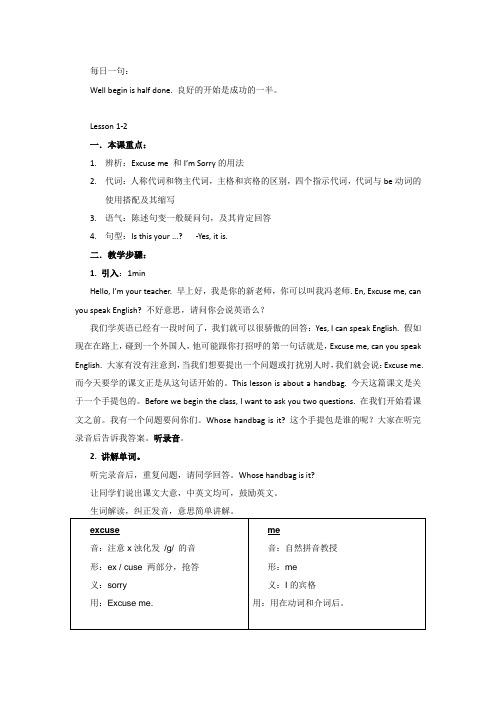
每日一句:Well begin is half done. 良好的开始是成功的一半。
Lesson 1-2一.本课重点:1.辨析:Excuse me 和I’m Sorry的用法2.代词:人称代词和物主代词,主格和宾格的区别,四个指示代词,代词与be动词的使用搭配及其缩写3.语气:陈述句变一般疑问句,及其肯定回答4.句型:Is this your ...? -Yes, it is.二.教学步骤:1. 引入:1minHello, I’m your teacher. 早上好,我是你的新老师,你可以叫我冯老师. En, Excuse me, can you speak English? 不好意思,请问你会说英语么?我们学英语已经有一段时间了,我们就可以很骄傲的回答:Yes, I can speak English. 假如现在在路上,碰到一个外国人,他可能跟你打招呼的第一句话就是,Excuse me, can you speak English. 大家有没有注意到,当我们想要提出一个问题或打扰别人时,我们就会说:Excuse me. 而今天要学的课文正是从这句话开始的。
This lesson is about a handbag. 今天这篇课文是关于一个手提包的。
Before we begin the class, I want to ask you two questions. 在我们开始看课文之前。
我有一个问题要问你们。
Whose handbag is it? 这个手提包是谁的呢?大家在听完录音后告诉我答案。
听录音。
2. 讲解单词。
听完录音后,重复问题,请同学回答。
Whose handbag is it?让同学们说出课文大意,中英文均可,鼓励英文。
生词解读,纠正发音,意思简单讲解。
3. 再听一遍课文,精讲课文。
a.Excuse me 和I’m sorry. 的用法区别。
Excuse me. 1、向陌生人问路时. eg:不好意思,请问电影院怎么走?2、引起对方注意时. Eg: 不好意思,这个奥特曼给我玩一下么?3、在某个聚会或对话中突然中途要离开一会儿时eg: 不好意思,我要去趟洗手间。
新概念英语第一册lesson-讲义
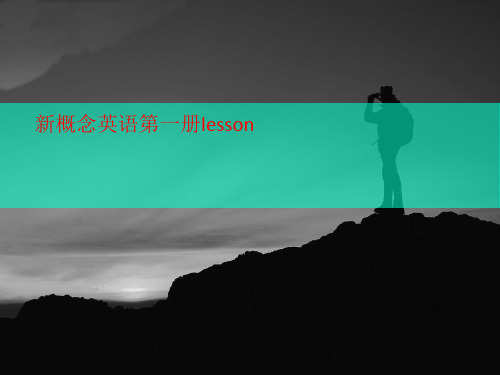
• 刚才您在肉店里吗?
• Were you at the butcher's? • 我在蔬菜水果店里。
• I was at the greengrocer's. • 吉米今天怎么样?
• How's Jimmy today? • 上星期他没上学吧?
• Was he absent from school last week?
翻译
• I am going to stay at my mother’s this Friday.
• They are going to stay at her grandfather’s this weekend.
• Absent adj. 缺席的 • Be absent from 不在,缺席 • Be absent from school 缺课 • Be absent from work 旷工
新概念英语第一册lesson
精品jing
Part one
• Guess • What’s the meaning? • Like, enjoy
Part one
• One part of your body
Part one
• The place where students study and learn
5分钟烧开
Proverbs
A prime minister's heart is big enough to sail a boat in.
宰相肚里能撑船
Part three
• Can you count? • 猜数字游戏
33
24
64
Part four
• 绕口令游戏
绕口令游戏
新概念英语第1册课程讲义Lesson105-106
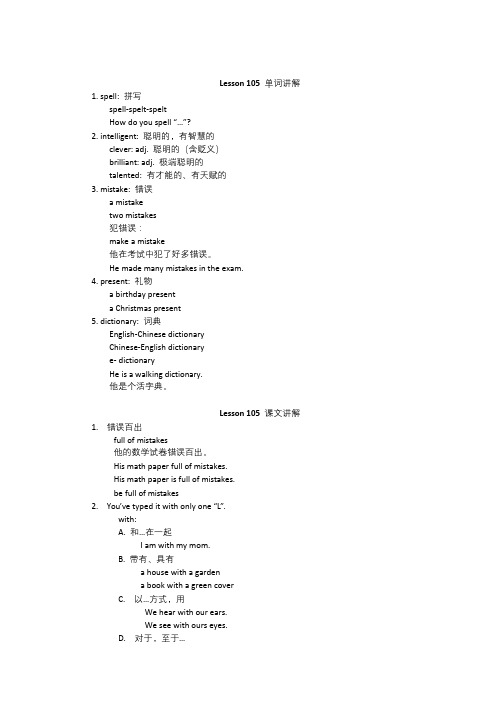
Lesson 105 单词讲解1. spell: 拼写spell-spelt-speltHow do you spell “…”?2. intelligent: 聪明的,有智慧的clever: adj. 聪明的(含贬义)brilliant: adj. 极端聪明的talented: 有才能的、有天赋的3. mistake: 错误a mistaketwo mistakes犯错误:make a mistake他在考试中犯了好多错误。
He made many mistakes in the exam.4. present: 礼物a birthday presenta Christmas present5. dictionary: 词典English-Chinese dictionaryChinese-English dictionarye- dictionaryHe is a walking dictionary.他是个活字典。
Lesson 105 课文讲解1. 错误百出full of mistakes他的数学试卷错误百出。
His math paper full of mistakes.His math paper is full of mistakes.be full of mistakes2. You’ve typed it with only one “L”.with:A. 和…在一起I am with my mom.B. 带有、具有a house with a gardena book with a green coverC. 以…方式,用We hear with our ears.We see with ours eyes.D. 对于,至于…What are you going to do with that…?What’s the matter with you?3. I’m sorry about that.about:A. 关于…a book about Chinese historyB. …怎么样?(询问或提意见)What about you?What about a drink?Sorry about it\that.Lesson 105 语法讲解动词不定式:1. 构成:to dowant to dowant sb. to dotell sb. to doask sb. to do…2. 使用:他想买一辆新车。
新概念英语第1册课程讲义Lesson95-96
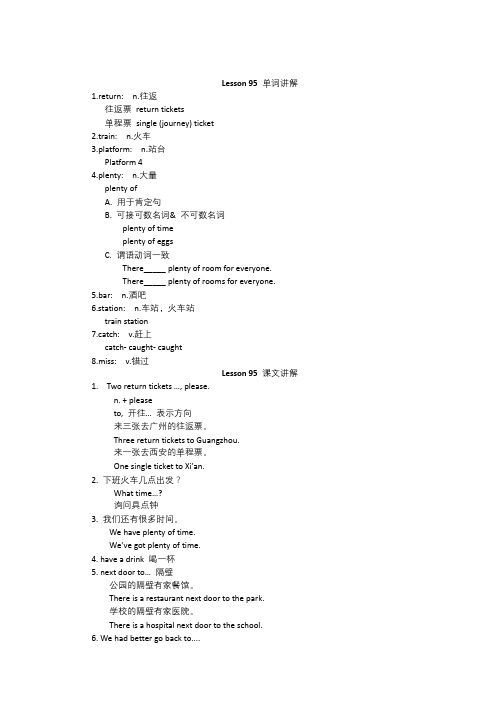
Lesson 95 单词讲解1.return: n.往返往返票return tickets单程票single (journey) ticket2.train: n.火车3.platform: n.站台Platform 44.plenty: n.大量plenty ofA. 用于肯定句B. 可接可数名词& 不可数名词plenty of timeplenty of eggsC. 谓语动词一致There_____ plenty of room for everyone.There_____ plenty of rooms for everyone.5.bar: n.酒吧6.station: n.车站,火车站train station7.catch: v.赶上catch- caught- caught8.miss: v.错过Lesson 95 课文讲解1. Two return tickets …, please.n. + pleaseto, 开往…表示方向来三张去广州的往返票。
Three return tickets to Guangzhou.来一张去西安的单程票。
One single ticket to Xi’an.2. 下班火车几点出发?What time…?询问具点钟3. 我们还有很多时间。
We have plenty of time.We’ve got plenty of time.4. have a drink 喝一杯5. next door to…隔壁公园的隔壁有家餐馆。
There is a restaurant next door to the park.学校的隔壁有家医院。
There is a hospital next door to the school.6. We had better go back to....had better: 最好7. We want to catch the eight nineteen…the eight nineteen- the train leaves at 8:198. 那钟慢了10 分钟。
新概念英语第1册课程讲义Lesson141-142
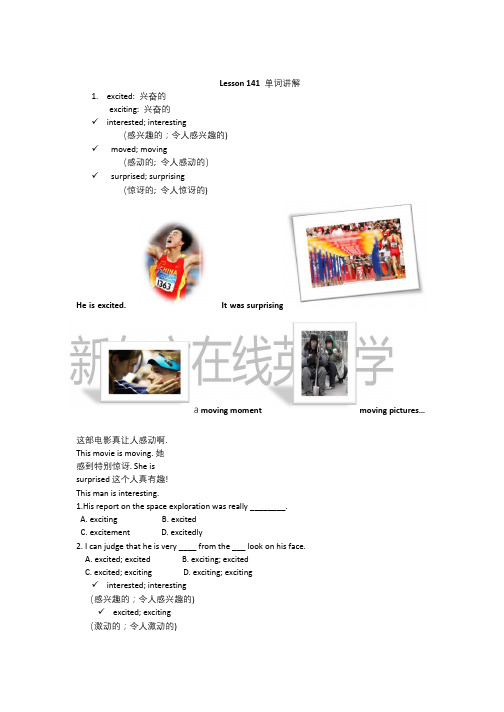
Lesson 141 单词讲解1. excited: 兴奋的exciting: 兴奋的✓interested; interesting(感兴趣的;令人感兴趣的)✓moved; moving(感动的; 令人感动的)✓surprised; surprising(惊讶的; 令人惊讶的)He is excited. It was surprisingamoving moment moving pictures…这部电影真让人感动啊.This movie is moving. 她感到特别惊讶. She issurprised 这个人真有趣!This man is interesting.1.His report on the space exploration was really ________.A. excitingB. excitedC. excitementD. excitedly2. I can judge that he is very ____ from the ___ look on his face.A. excited; excitedB. exciting; excitedC. excited; excitingD. exciting; exciting✓interested; interesting(感兴趣的;令人感兴趣的)✓excited; exciting(激动的;令人激动的)✓moved; moving(感动的; 令人感动的)✓surprised;surprising(惊讶的; 令人惊讶的)2. get on: 登上get in: 上车3. middle-aged: 中年的一位中年女士:a middle-aged lady老年的:elderly people4. opposite: 在…的对面prep. 介词He is sitting opposite me.5. curiously: 好奇地curious: 好奇的The boy was curious about everything he saw.be curious about…6. funny: 可笑的、滑稽的稍有贬义色彩He closed his speech with a funny joke.他用一则有趣的笑话结束了演讲。
完整的新概念英语一讲义
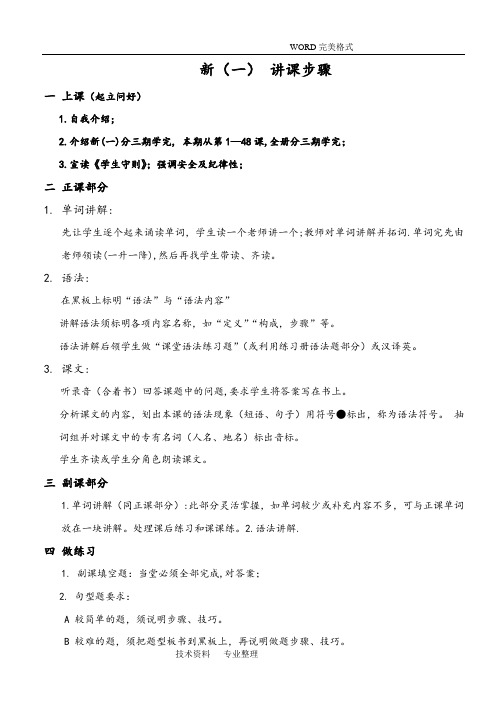
新(一)讲课步骤一上课(起立问好)1.自我介绍;2.介绍新(一)分三期学完, 本期从第1—48课,全册分三期学完;3.宣读《学生守则》;强调安全及纪律性;二正课部分1. 单词讲解:先让学生逐个起来诵读单词,学生读一个老师讲一个;教师对单词讲解并拓词.单词完先由老师领读(一升一降),然后再找学生带读、齐读。
2. 语法:在黑板上标明“语法”与“语法内容”讲解语法须标明各项内容名称,如“定义”“构成,步骤”等。
语法讲解后领学生做“课堂语法练习题”(或利用练习册语法题部分)或汉译英。
3. 课文:听录音(合着书)回答课题中的问题,要求学生将答案写在书上。
分析课文的内容,划出本课的语法现象(短语、句子)用符号●标出,称为语法符号。
抽词组并对课文中的专有名词(人名、地名)标出音标。
学生齐读或学生分角色朗读课文。
三副课部分1.单词讲解(同正课部分):此部分灵活掌握,如单词较少或补充内容不多,可与正课单词放在一块讲解。
处理课后练习和课课练。
2.语法讲解.四做练习1. 副课填空题:当堂必须全部完成,对答案;2. 句型题要求:A 较简单的题,须说明步骤、技巧。
B 较难的题,须把题型板书到黑板上,再说明做题步骤、技巧。
C 如句型题中出现新的语法现象,须将语法讲解清楚,带着学生做题。
D 句型题根据上课具体情况安排,数个至全部在课堂上由学生完成,其余题或典型题留成作业。
五作业:学生应准备三个本,(两个作业本AB,一个听写本)1.课文(正课)背写一遍→家长签字。
收改;2.单词(正课+副课)带音标抄3遍。
汉语一遍收改(前48课第一期,后两期可省去);3.课后练习题(句型题)做在本子上,前5个或一半,收改;4.课课练与本课对应练习完成。
收改;(其中难题在第四部分上课解决)。
5.单词、课文在下次课上分别听写、默写,100分者在听写本上扣章。
6.奖励方法:听写得连续5个一级棒,换一个小博士, 一期结束,看谁得最多有奖品;六其他:1.收测试卷费,订课课练答案;2.严格遵守“喝茶”及“考试、考勤”制度;3. 试卷考完后利用课堂最后的时间进行讲解,考试内容较多的分次讲解。
- 1、下载文档前请自行甄别文档内容的完整性,平台不提供额外的编辑、内容补充、找答案等附加服务。
- 2、"仅部分预览"的文档,不可在线预览部分如存在完整性等问题,可反馈申请退款(可完整预览的文档不适用该条件!)。
- 3、如文档侵犯您的权益,请联系客服反馈,我们会尽快为您处理(人工客服工作时间:9:00-18:30)。
一、单词与短语mild: adj.温和的,温暖的;①adj.(天气等)温和的、温暖的;例句:We had a mild winter last year.去年我们度过了一个温暖的冬天。
②adj.(人性情等)温和的;例句:Tom is a mild man who never gets angry.汤姆性情温和从来不生气③adj.(食物等)味道淡的;例句:Try this mild soap.尝一下这味道清淡的汤。
always: adv.总是;always是一个常见的词也是一个经常考的词,关于always这个词的考点需要掌握以下三点:①always与Sometimes、usually、regularly、often、every year、every week、every day等词及短语是一般现在时显着的标志。
②always有“一再、老是”的意思,这个词义在考试中也常考,它表示“对一种经常出现的情况或动作的一种厌烦情绪”如:He is always late for class:他上课总是迟到。
③关于always的一个常见的重点搭配形式:be always doing sth: 总是、、、它也表示“对一种经常出现的情况或动作的一种厌烦情绪”。
如:He is always asking silly questions.他总是问些愚蠢的问题。
方位的表达:east: n.东方;west: n.西方;south: n.南方;north: n.北方;补充:northeast东北;northwest西北;southeast东南;southwest西南;另外在方位前一定要加定冠词the。
wet: adj.潮湿的;season: n.季节;best: adv.最;adj.最好的;n.最佳者,最好的东西;best这个词在英语中也是经常考的词,关于这个词在中学阶段应该重点掌握以下三点:①best 是形容词good和副词well的最高级形式表示“最好的”的意思。
例:what is the best way to solve the prolem?解决这个问题最好的方式是什么?②当best作副词的时候需要掌握一个重点短语:had best:最好,这个短语跟had better可以互换。
如:You had best do it again.你最好再做一次另一种表达方式:You had better do it again.你最好再做一次。
③另外两个在考试中常考的关于best的短语:Try one’s best:尽全力、、、例句:Try your best to get there early尽量早点到那儿去make the best of:充分利用;例句:Make the best of your time.充分利用你的时间night: n. 夜晚rise: v.升起early:adv.早get up early:早点起床set: v.太阳落下去,另外set还有放置、树立、引发、发动等等的意思,关于set考试中常考的短语有:①set off:启程,出发,动身;例句:We set off at dawn我们在黎明的时候动身②set up:建立、创立;例句:A new hospital has been set up in the city城市里新建了一座医院③set free:释放、放出例句:He was set free from the prison 3 days ago.他三天前从监狱里被放了出来late: adv.晚、迟,be late for class:上课迟到interesting: adj.有趣的、有意思的;subject:n.话题conversation:n.谈话 have a conversation with sb:跟某人谈话二、课文中的短语句型语法(1)复习52课出现的短语及句型★come from 和 be frombe from和come from都可以表示来自某地,二者意思相同,表示某人来自哪里的时候有两种表达方式:Where do you come from?和Where are you from? 注意两者在表达方式上的区别★what+be+主语+like即what…like句型。
What is the weather like...? 天气怎样?What is the climate like...? 气候怎样?(2)本课需掌握的两个重点句型:★which+主语+do you like best表示:在所有的东西中最喜欢什么。
例句:Which seasons do you like best?你最喜欢哪些季节?Which books do you like best?你最喜欢看哪些书?★It is my favourite、、、这是我最喜欢的、、、例句:It is my favourite book这是我最喜欢的书It is my favourite football team.这是我最喜欢的足球队(3)需要重点掌握的两个词:rise 和raiserise 和raise是英语考试中常见的两个词一定要区分清楚:★rise: v.①表示日月等的上升例句:The sun rises in the east:太阳在东方升起②表示河水、物价、温度的上涨、上升与提高例句:The price is still rising:价格一直在上涨③起身、起床例句:The students rise early:学生们起床很早★raise:vt.①表示举起抬起例句:I can not raise this heave box.我举不起这个沉重的箱子②表示提高增加的意思例句:My salary was raised two weeks ago两星期前我工资涨了③表示饲养动物栽培农作物raise cattles:养牛 raise wheat:种小麦rise 和raise 两个词作动词时最重要的区别是rise是不及物动词而raise是及物动词。
(4)需要掌握的一个重点表达方式In the North=in the north of England表示一个国家或地区的方位词如果单独使用一般要大写,特指某国或某地区的方位,但仅仅是表示方位意义的方位词则不要要大写,如a north wind;(5)需要重点掌握的语法:定冠词the 的用法定冠词the 用法口诀:1.有水无湖:海、洋、海湾、河等,都用the;单个湖不用the,(但多个湖用the);the Red Sea, the Pacific Ocean, the Persian Gulf, the Yangtze RiverThe Great Lakes(五大湖);Lake Erie(伊利湖)2.有球无星:地球,月亮用the;行星不用the: Mars,Venus;3.有山无峰:The Huangshan Mountains(黄山);Mount Everest(珠穆朗玛峰); Mount(or Mt.) Tai(泰山)4.有独无欧(偶):独一无二的,the earth,the moon,the sun 用the; 欧洲等七大洲不用the. Europe, Africa, Asia, North America, South America, Antarctica, Oceania5.有(足)族无球(运动):种族用the:the Indians(印第安人);球类运动:baseball, basketball6.有文无章:历史性的文件用the;小说等的章节不用theThe Constitution(宪法); chapter one7.学而不专:学校放在词组的前面时用the;专有名词放在词组的前面时不用the;The University of Fudan; Fudan University8、月份、季节要加the.Lesson 54 what nationality are they?where do they come from?一、单词与短语(1)Australia: n.澳大利亚→Astralian: n.澳大利亚人;adj.澳大利亚的、澳大利亚人的。
(2)Austria: n.奥地利→Austrian: n.奥地利人;adj.奥地利的、奥地利人的。
(3)Canada: n.加拿大→Canadian: n.加拿大人;adj.加拿大的、加拿大人的。
(4)Finland: n.芬兰→Finnish: n.芬兰人人;adj.芬兰的、芬兰人的。
(5)India : n.印度→Indian: n.印度人;adj.印度的、印度人的(6)Japan : n.日本→Japanese: n.日本人;adj.日本的、日本人的(7)Nigeria : n.尼日利亚→Nigerian: n.尼日利亚人;adj.尼日利亚的、尼日利亚人的(8)Turkey : n.土耳其→Turkish: n.土耳其人;adj.土耳其的、土耳其人的(9)Poland : n.波兰→Polish: n.波兰人;adj.波兰的、波兰人的(10)Thailand : n.泰国→Thai: n.泰国人;adj.泰国的、泰国人的(11)Korea : n.韩国→Korean: n.韩国人;adj.韩国的、韩国人的二、课文中的短语语法课文主要是对what nationality are they?和wheredo they come from?两个句型的复习与继续锻炼。
what nationality are they?其中的nationality是指国籍的意思,这句话的意思是,“他们是哪国人?”。
就国籍提问,回答时要用“哪国人”来作答。
where do they come from?“他们来自哪里?”,就具体地点提问,回答时要用“地点”来作答。
例句:what nationality are they?They are Chinese 或者是Their nationality is Chinese.where do they come from?They come from China.。
